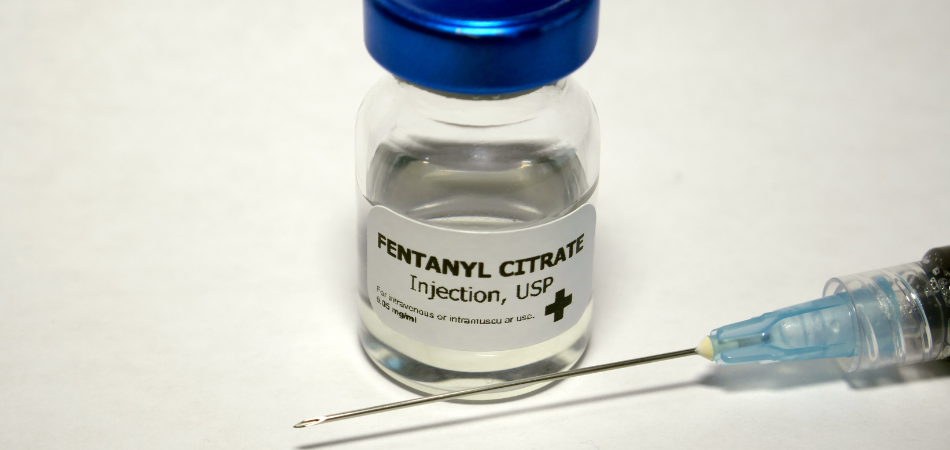
Written by:

Medically Reviewed by:
Last Updated:
February 14th, 2025
Fentanyl Addiction
What is fentanyl?
Fentanyl is a powerful synthetic opioid used primarily in the medical world for managing severe pain, particularly in cancer patients or after surgery. It works by binding to opioid receptors in the brain, providing fast-acting pain relief. Medically, it is available in forms such as patches, injections and lozenges.
In the UK, fentanyl is a controlled substance under the Misuse of Drugs Act 1971, meaning it’s legal when prescribed by a healthcare professional but illegal to possess or supply without a prescription.
Due to its potency, fentanyl has a high risk of misuse and is linked to many overdose deaths.
What makes fentanyl addictive?
The United States is facing a crisis with fentanyl, a drug responsible for an alarming rise in overdose deaths. But why is this drug having such a devastating impact across the country? Fentanyl is incredibly potent, up to 50 to 100 times stronger than morphine, making even small doses highly dangerous.
On a biological level, fentanyl binds to opioid receptors in the brain, flooding the body with intense feelings of euphoria and pain relief. This rapid and overwhelming stimulation can quickly lead to dependence as the brain craves that same sensation repeatedly. Over time, the body builds tolerance, requiring higher doses to achieve the same effect, which is where the danger escalates.
The speed at which fentanyl alters the brain’s reward system makes it one of the most addictive drugs in the world, trapping individuals in a cycle that’s incredibly hard to break without professional help.
How can a fentanyl addiction affect my life?
Death is a big possibility when it comes to fentanyl addiction because even a tiny amount of the drug can be life-threatening. If someone is taking fentanyl illegally, one misstep, such as unknowingly taking a dose that’s too strong, can result in an unintended, fatal overdose. But even if someone is able to sidestep the high risk of death, fentanyl addiction can still have devastating effects on various aspects of a person’s life. Here’s how it can affect you:
Physical health deterioration
Fentanyl is incredibly potent, and long-term use can wreak havoc on the body. It weakens the immune system, making a person more susceptible to infections and illnesses. Chronic use can lead to respiratory issues, heart problems and liver or kidney damage. Over time, the body’s ability to function normally deteriorates, leading to severe fatigue, malnutrition and constant physical pain due to heightened sensitivity to pain (a condition known as hyperalgesia).
Social isolation and strained relationships
Addiction often leads to strained or broken relationships. Loved ones may try to help, but as the addiction deepens, trust is often lost. Lying, stealing or manipulating behaviours can destroy friendships, family ties and romantic relationships. Fentanyl addiction can push people into isolation, leading to intense loneliness.
Financial ruin
Fentanyl addiction is expensive, and supporting such a habit often leads to financial difficulties. Addicts may lose their jobs, struggle with mounting debt or engage in illegal activities to fund their addiction. The financial strain can be catastrophic, with long-term effects such as bankruptcy, homelessness and loss of property.
Legal consequences
Using fentanyl illegally is not only dangerous but also puts someone at risk of legal trouble. Being caught with fentanyl or engaging in criminal activities to sustain the addiction can lead to arrest, fines and imprisonment. The legal ramifications can follow a person for years, damaging their ability to rebuild a stable life.
What are the signs of fentanyl addiction?
It’s crucial to know the signs of fentanyl addiction, as recognising them early can be life-saving. If you notice any signs of fentanyl addiction in your friends or family, seeking medical services immediately is essential.
Addiction can take hold quickly, and due to fentanyl’s potency, the risks of overdose and other health complications are significant. Understanding these warning signs allows you to intervene and support your loved one before it’s too late.
Physical signs
- Drowsiness: Constant sleepiness or a “nodding off” state, even during activities.
- Pinpoint pupils: A common sign of opioid use, pupils appear unusually small, even in dim lighting.
- Weight loss: Unexplained and rapid weight loss due to a lack of appetite.
- Slurred speech: Difficulty speaking clearly, with slowed and slurred words.
- Respiratory issues: Shallow or slowed breathing, which can be life-threatening during an overdose.
Psychological signs
- Increased tolerance: Needing larger doses of fentanyl to achieve the same effects, leading to frequent use.
- Cravings: Intense urges to take fentanyl, making it hard to focus on anything else.
- Mood swings: Extreme shifts in mood, from euphoria when using the drug to irritability or depression when not.
- Anxiety or paranoia: Heightened feelings of fear or worry, sometimes without clear reason.
Behavioural signs
- Doctor Shopping: Visiting multiple doctors or pharmacies to obtain more fentanyl prescriptions (Note: this behaviour is common in countries with a privatised healthcare system)
- Neglecting responsibilities: Failing to meet obligations at work, school or home due to drug use.
- Isolation: Withdrawing from social interactions, family gatherings or activities once enjoyed.
- Financial issues: Unexplained financial problems or borrowing money frequently to fund the addiction.
- Secretive behaviour: Hiding drug use, lying about it or avoiding discussions around the topic.
Can Liberty House help with fentanyl addiction?
While fentanyl hasn’t impacted the UK to the same extent as the US, there’s still a real possibility of this powerful opioid making its way into the country. This dangerous substance requires immediate attention and professional care if addiction is suspected.
At Liberty House, our specialised fentanyl addiction treatment programme is designed to offer the support you need. Beginning with a thorough assessment, we provide a medically monitored detox to help manage withdrawal symptoms safely.
Following detox, we offer traditional therapies such as DBT and group counselling alongside holistic treatments like art therapy and yoga to promote emotional healing.
Our comprehensive aftercare ensures ongoing support as you reintegrate into daily life, offering you the best chance of lasting recovery.
If you or a loved one is struggling with fentanyl addiction, reaching out to Liberty House could be the first step toward reclaiming a healthier future.
Frequently Asked Questions
(Click here to see works cited)
- NIDA. 2021, June 1. Fentanyl DrugFacts. Retrieved from https://nida.nih.gov/publications/drugfacts/fentanyl on 2024, October 21
- NIDA. 2024, August 21. Drug Overdose Deaths: Facts and Figures . Retrieved from https://nida.nih.gov/research-topics/trends-statistics/overdose-death-rates on 2024, October 21








